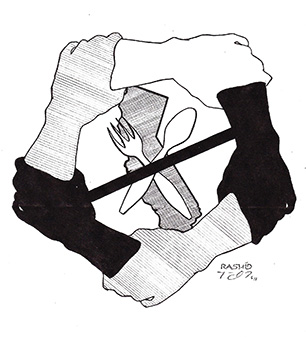Prisoners in Pelican Bay State Prison’s Security Housing Unit (SHU) are isolated for at least twenty-two and a half hours a day in cramped, concrete, windowless cells. They are denied telephone calls, contact visits, any kind of programming, adequate food and, often, medical care. Nearly 750 of these men have been held under these conditions for more than a decade, dozens for over 20 years. This treatment has inflicted profound psychological suffering and caused or exacerbated debilitating physical ailments.
Ostensibly, these men are in the SHU because they associate with gang members and isolating them is necessary to prevent gang activity and racially motivated violence. But in the summer and fall of 2011, these men, joined by other SHU prisoners throughout California, showed this claim to be the lie that it is. Organizing across racial lines, more than 6,000 SHU prisoners went on hunger strike for several weeks to protest their conditions. That’s right – men who have been isolated for over a decade and deprived of basic human rights because they are allegedly connected to racially divided gangs worked together to demand basic rights and constitutional protections for themselves and one another. Now they have resumed their hunger strike, demanding that the California Department of Corrections and Rehabilitation meet their demands.
Here is the fifth in our series of their stories and those of their families.
Danny Troxell, plaintiff in the Center for Constitutional Rights lawsuit challenging long-term solitary confinement
I’m denied physical contact with family and friends. I’m not allowed to make or receive phone calls or have a photograph taken to send home. None of my nieces, nephews [or] grandchildren have ever heard my voice or seen what I look like. They all live in another state and can’t afford the expense to come visit me. For most of us in the SHU, mail is our only connection to the outside and to family and friends. Sadly, this institution wants to break as many ties and bonds to family and community as it can. Staff members constantly look for ways to make the SHU more punitive. One tactic is to totally stop, or to delay for weeks at a time, our personal mail. This is all designed in an effort to frustrate and disrupt any bonds we may have with family or friends on the outside. Many of them just decide to stop writing rather than endure the frustration.
Join us in defending the truth before it’s too late
The future of independent journalism is uncertain, and the consequences of losing it are too grave to ignore. To ensure Truthout remains safe, strong, and free, we need to raise $24,000 by the end of today. Every dollar raised goes directly toward the costs of producing news you can trust.
Please give what you can — because by supporting us with a tax-deductible donation, you’re not just preserving a source of news, you’re helping to safeguard what’s left of our democracy.
